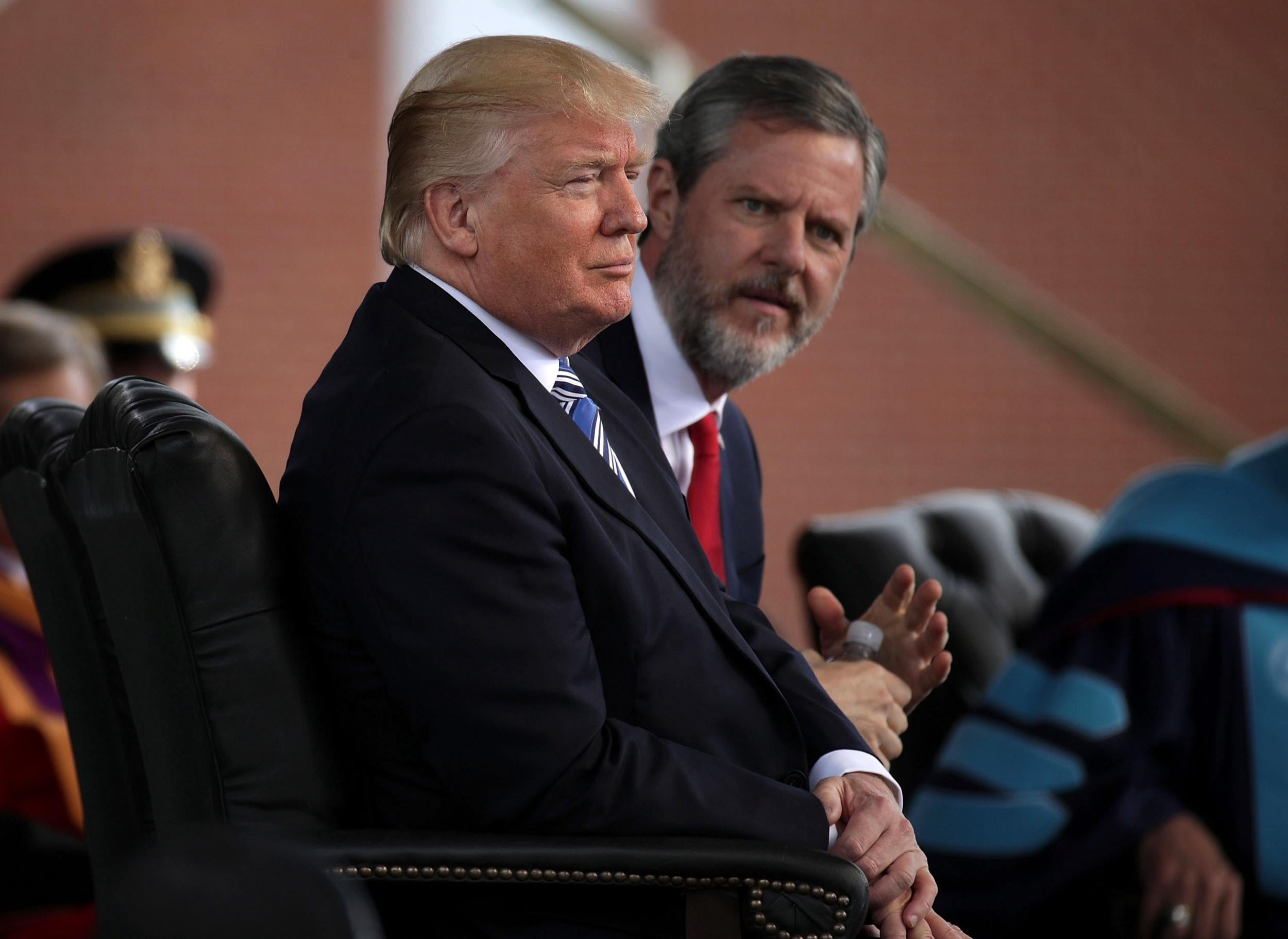Why Trump’s loss of evangelical support could cost him the election
Given president makes no effort to expand base of support, he needs those who turned out in 2016 to do so again, writes Andrew Buncombe


One evening a long time ago, in what feels like a galaxy far away, Donald Trump was utterly charming.
Speaking to prospective voters in Davenport, Iowa, on a freezing night in January 2016, the presidential hopeful oozed warmth and humility, and even joked at his own expense. It may well have been because Trump knew just how important his appearance that night with evangelical leader Jerry Falwell would be in winning over social conservatives.
“I did pretty well in the Des Moines Register poll,” he said of the much-watched survey, that put him five points clear of his rivals. “It showed me ahead with evangelicals.”
Trump came second in Iowa, but went on to easily win the Republican nomination. In that year’s general election, exit polls suggested he secured the support of 80 per cent of white evangelicals. Some have since questioned that number, but either way, evangelicals have remained the bedrock of the president’s base.
That may be crumbling, at least in part. A recent poll published by the New York Times suggested his approval rating among evangelicals had fallen by 20 per cent since March. Support among white catholics had seen a similar drop.
The unhappiness among the religious conservatives was the latest sign of trouble among groups of voters whom Trump greatly relied on four years ago. A poll by ABC/Washington Post suggested support among non-college educated women had fallen by 11 points. He has also seen a drop in support among the elderly, perhaps because of the government’s handling of the coronavirus pandemic, to which those aged 65 and above have been particularly vulnerable.
Meanwhile, five months from election day, an NBC News/Wall Street Journal found Trump trailing Joe Biden nationally by as many as seven points.
Among the most significant criticisms of Trump from the evangelical community came from 90-year-old Pat Robertson, a highly influential southern baptist leader.
Robertson, who himself ran for the presidency in 1988, told viewers of his The 700 Club show, that Trump’s response to largely peaceful protesters who had gathered in Lafayette Park close to the White House was unacceptable.
In a move to clear the park, authorities fired tear gas and flash munitions, while battling and beating protesters and some members of the media.
“It seems like now is the time to say, 'I understand your pain, I want to comfort you, I think it's time we love each other’,” said Robertson. “But the president took a different course. He said, ‘I am the ‘president of law and order’, and he issued a heads-up.”
In a rare discussion of racism, he said “we are one” and “God made us all”.
“We've got to love each other, we just got to do that. We are all one race, and we need to love each other.”
The rebuke by Robertson was all the more noteworthy given the reason for Trump’s decision to clear Lafayette Park. In what was widely condemned as a “photo-op” for his base, the president and his entourage walked out from the White House, where he posed awkwardly with a Bible outside St John’s Episcopal Church, which had been damaged the previous night during the protests.
“Is that your Bible, Mr President,” he was asked. “It’s a Bible,” came the reply.
This is not the first time Trump has showed himself to be ill at ease with the trappings of the Christian church. A day after he appeared at the Adler Theatre in Davenport with Jerry Falwell, he reportedly mistook the silver Communion plates passed round at a church service in Council Bluffs, as the offering plates, and dug out some money from his pockets.
On other occasions, including during an address to students at Falwell’s Liberty University, he has mangled references to the Bible in a manner that might lead one to conclude he did not read it as often as he claims,
All of which has made quite striking the loyalty of evangelicals. How could such people throw their support and financial backing behind someone whose words and deeds often appear anything but Christian?
Yet, it is evangelicals who are usually the most transparent about why they support the president.
Go to any Trump rally and ask some identifying themselves as a religious conservative why they are backing him and they will tell you it is what his administration has done on issues they care about - the appointment of conservatives to the Supreme Court and numerous other benches, his defence of so-called “religious freedom”, his support of Israel and recognition of Jerusalem as its capital, something many evangelicals believe is foretold to to be necessary for the so-called “second coming”. Nobody says it is for his familiarity with 1 Corinthians.
Trump’s friend Falwell, has his own problems too.
This week, he was forced to apologise after tweeting an image of a person in black face and another in a Ku Klux Klan hood and robe. The images were taken from Virginia governor Ralph Northam’s notorious medical school year, and was reportedly intended as an attack on the Democrat’s requirement for people to wear masks in public.
Nobody found it funny, including a member of staff who quit, and 35 former students and alumni who wrote to Falwell telling him to cease his “infantile behaviour”.
Trump has said nothing about Falwell’s deeds. He knows that come November, he is going to need every evangelical voter he can find.
Join our commenting forum
Join thought-provoking conversations, follow other Independent readers and see their replies
Comments